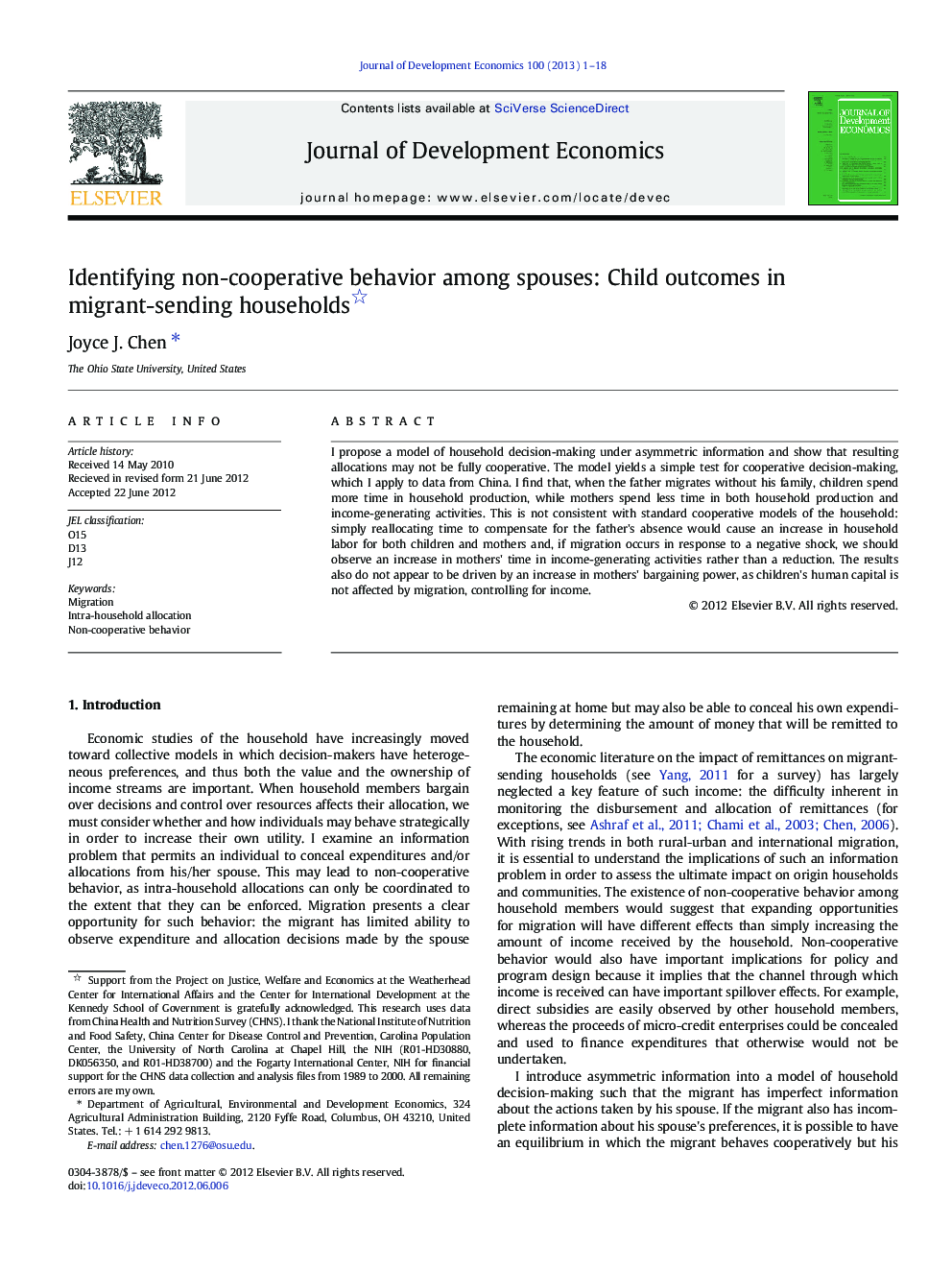| کد مقاله | کد نشریه | سال انتشار | مقاله انگلیسی | نسخه تمام متن |
|---|---|---|---|---|
| 5094717 | 1478511 | 2013 | 18 صفحه PDF | دانلود رایگان |
عنوان انگلیسی مقاله ISI
Identifying non-cooperative behavior among spouses: Child outcomes in migrant-sending households
ترجمه فارسی عنوان
شناسایی رفتارهای غیردولتی در میان همسران: نتایج کودکان در خانوارهای فرستاده مهاجر
دانلود مقاله + سفارش ترجمه
دانلود مقاله ISI انگلیسی
رایگان برای ایرانیان
ترجمه چکیده
من یک مدل تصمیم گیری خانوار را در زیر اطلاعات نامتقارن پیشنهاد می کنم و نشان می دهد که تخصیص های حاصل ممکن است به طور کامل تعاونی نباشد. این مدل یک تست ساده برای تصمیم گیری های تعاونی است که من در مورد داده های چین اعمال می کنم. من متوجه می شوم که وقتی پدر بدون خانواده اش مهاجرت می کند، کودکان در زمان تولید خانگی بیشتر وقت خود را صرف می کنند، در حالی که مادران زمان کمتری در فعالیت های خانگی و تولید درآمد کسب می کنند. این سازگار با مدل های تعاونی استاندارد خانوار نیست: صرف زمان مجدد برای جبران عدم غیبت پدر باعث افزایش کارایی خانوار برای هر دو کودک و مادر می شود و اگر مهاجرت در پاسخ به شوک منفی اتفاق بیفتد باید افزایش یابد در زمان مادری در فعالیت های درآمدزا به جای کاهش. به نظر نمی رسد که نتایج به دست آوردن قدرت چانه زنی مادران نیز افزایش یابد، زیرا سرمایه انسانی کودکان تحت تأثیر مهاجرت قرار نمی گیرد و برای درآمد کنترل نمی شود.
موضوعات مرتبط
علوم انسانی و اجتماعی
اقتصاد، اقتصادسنجی و امور مالی
اقتصاد و اقتصادسنجی
چکیده انگلیسی
I propose a model of household decision-making under asymmetric information and show that resulting allocations may not be fully cooperative. The model yields a simple test for cooperative decision-making, which I apply to data from China. I find that, when the father migrates without his family, children spend more time in household production, while mothers spend less time in both household production and income-generating activities. This is not consistent with standard cooperative models of the household: simply reallocating time to compensate for the father's absence would cause an increase in household labor for both children and mothers and, if migration occurs in response to a negative shock, we should observe an increase in mothers' time in income-generating activities rather than a reduction. The results also do not appear to be driven by an increase in mothers' bargaining power, as children's human capital is not affected by migration, controlling for income.
ناشر
Database: Elsevier - ScienceDirect (ساینس دایرکت)
Journal: Journal of Development Economics - Volume 100, Issue 1, January 2013, Pages 1-18
Journal: Journal of Development Economics - Volume 100, Issue 1, January 2013, Pages 1-18
نویسندگان
Joyce J. Chen,
